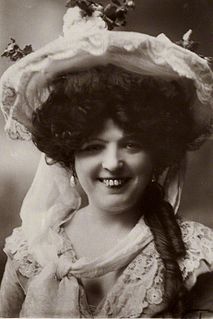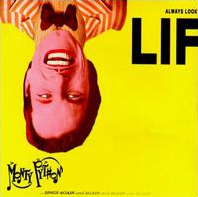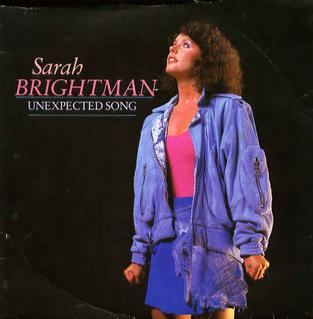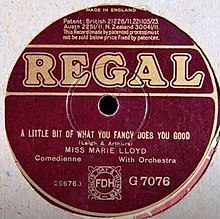A mondegreen is a mishearing or misinterpretation of a phrase in a way that gives it a new meaning. Mondegreens are most often created by a person listening to a poem or a song; the listener, being unable to hear a lyric clearly, substitutes words that sound similar and make some kind of sense. The American writer Sylvia Wright coined the term in 1954, recalling a childhood memory of her mother reading the Scottish ballad "The Bonny Earl of Murray", and mishearing the words "layd him on the green" as "Lady Mondegreen".

Andrew Lloyd Webber, Baron Lloyd-Webber, is an English composer and impresario of musical theatre. Several of his musicals have run for more than a decade both in the West End and on Broadway. He has composed 21 musicals, a song cycle, a set of variations, two film scores, and a Latin Requiem Mass.

Music hall is a type of British theatrical entertainment that was popular from the early Victorian era, beginning around 1850. It faded away after 1918 as the halls rebranded their entertainment as variety. Perceptions of a distinction in Britain between bold and scandalous Victorian Music Hall and subsequent, more respectable Variety differ. Music hall involved a mixture of popular songs, comedy, speciality acts, and variety entertainment. The term is derived from a type of theatre or venue in which such entertainment took place. In North America vaudeville was in some ways analogous to British music hall, featuring rousing songs and comic acts.
Joseph Tabrar was a prolific English writer of popular music hall songs. His song "Daddy Wouldn't Buy Me a Bow Wow" (1892) became Vesta Victoria's first major popular success.
"Pop! Goes the Weasel" is a traditional English and American song, a country dance, nursery rhyme, and singing game that emerged in the mid-19th century. It is commonly used in Jack-in-the-box toys and for ice cream trucks. The song is honored annually on June 14 which is National Pop Goes the Weasel Day.

The Hokey Pokey, also known as Hokey Cokey in the United Kingdom and the Caribbean, is a campfire song and participation dance with a distinctive accompanying tune and lyric structure. It is well known in English-speaking countries. It originates in a British folk dance, with variants attested as early as 1826. The song and accompanying dance peaked in popularity as a music hall song and novelty dance in the mid-1940s in the UK. The song became a chart hit twice in the 1980s. The first UK hit was by the Snowmen, which peaked at UK No. 18 in 1981.

Matilda Alice Victoria Wood, professionally known as Marie Lloyd, was an English music hall singer, comedian and musical theatre actress. She was best known for her performances of songs such as "The Boy I Love Is Up in the Gallery", "My Old Man " and "Oh Mr Porter What Shall I Do". She received both criticism and praise for her use of innuendo and double entendre during her performances, but enjoyed a long and prosperous career, during which she was affectionately called the "Queen of the Music Hall".

Arthur Lloyd was a Scottish singer, songwriter, comedian and impresario. Lloyd was the first prolific and successful singer-songwriter for music hall in the United Kingdom. He wrote more than 1,000 songs, many of which were performed by himself and others. One of his compositions, Not for Joseph was the first comic song to sell more than 100,000 copies. He established his own theatre company, opened a theatre in London, performed for royalty and toured extensively, touring North America in 1893–94.

"Always Look on the Bright Side of Life" is a comedy song written by Monty Python member Eric Idle that was first featured in the Python film Life of Brian and has gone on to become a common singalong at public events such as football matches as well as funerals.
The origins of rock and roll are complex. Rock and roll emerged as a defined musical style in the United States in the early to mid-1950s. It derived most directly from the rhythm and blues music of the 1940s, which itself developed from earlier blues, the beat-heavy jump blues, boogie woogie, up-tempo jazz, and swing music. It was also influenced by gospel, country and western, and traditional folk music. Rock and roll in turn provided the main basis for the music that, since the mid-1960s, has been generally known simply as rock music.
"The Boy I Love Is Up in the Gallery" is a music hall song written in 1885 by George Ware for music hall star Nelly Power, and made famous by Marie Lloyd. It was also sung by Jenny Hill.

An Artist's Model is a two-act musical by Owen Hall, with lyrics by Harry Greenbank and music by Sidney Jones, with additional songs by Joseph and Mary Watson, Paul Lincke, Frederick Ross, Henry Hamilton and Leopold Wenzel. It opened at Daly's Theatre in London, produced by George Edwardes and directed by James T. Tanner, on 2 February 1895, transferring to the Lyric Theatre on 28 May 1895, and ran for a total of 392 performances. The piece starred Marie Tempest in the title role, Hayden Coffin, Letty Lind, Leonora Braham, Eric Lewis, Maurice Farkoa, Marie Studholme, and Louie Pounds. It also had a Broadway run at the former Broadway Theatre from December 21, 1895 through February 8, 1896.

"Unexpected Song" is a 1984 song from the musical Song and Dance originally sung by Bernadette Peters. The music was written by Andrew Lloyd Webber, with lyrics by Don Black. It is one of Lloyd Webber's most frequently performed compositions.
"Oh! Mr Porter" is an old British music hall song about a girl who has got on the wrong train. It was famously part of the repertoires of the artistes Norah Blaney and Marie Lloyd. It was written in 1892 by George Le Brunn and his brother Thomas, and taken on an extended provincial tour that same year by Marie Lloyd. The lyrics include this chorus:
Ida Barr was an English music hall singer.

George Arthurs was an English songwriter, playwright, composer, author and screenwriter who contributed lyrics to several successful musical comedies such as The Belle of Mayfair (1906), Havana (1908) and Yes, Uncle! (1917), before writing dialogue for such films as The Yellow Mask (1931).
William Frederick Bridgen, known professionally as Fred W. Leigh, was an English lyricist who co-wrote several popular music hall songs of the early twentieth century,
Ernest Worton David was an English songwriter and music publisher.
John Patrick Harrington was an English lyricist of music hall songs, and writer.

"Let's All Go Down the Strand" is a popular British music hall song of the late 19th and early 20th centuries, written by Harry Castling and C. W. Murphy. It was first performed by Castling, and was published in 1909. It was inspired by the Strand, a street in Westminster, Central London, that in the late 19th century became a centre for theatres, hotels and music halls. The song has three verses describing people trying to persuade others to abandon their current plans to "go down the Strand". The first verse is about a group of tourists planning a trip to Germany, the second about prisoners in jail and the third about sailors returning with Ernest Shackleton from a polar expedition. The song was popular with British soldiers in the First World War. A refrain of "have a banana", not included in the published lyrics, was often interposed after the first line of the chorus. Sometimes "Gertie Gitana" was sung instead, leading to the use of "Gertie" as rhyming slang for the fruit. A version was released by rock band Blur in 1993.









